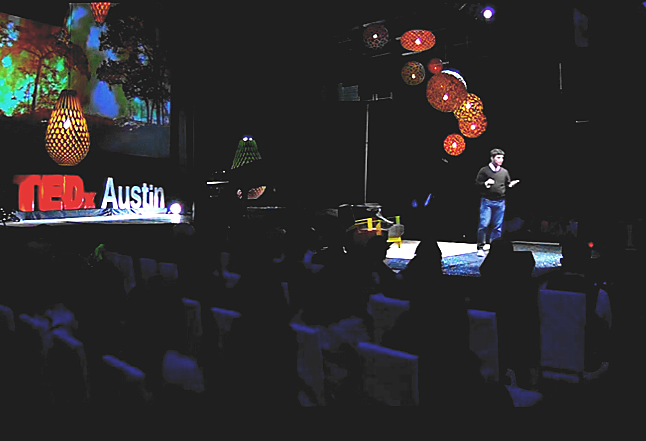So, I'm going to start off with kind of the buzzkill a little bit.
好吧,我的開場可能有點讓人掃興
Forty-two million people were displaced by natural disasters in 2010.
四千兩百萬人在2010年因災成為無家可歸的人。
Now, there was nothing particularly special about 2010,
不過,2010年可沒有什么太大不了的
because, on average, 31 and a half million people are displaced by natural disasters every single year.
因為,平均來說,每年因為各種自然災害而流離失所的人數(shù)達到了三千一百五十萬之多。
Now, usually when people hear statistics or stats like that,
通常,人們聽到這方面的統(tǒng)計數(shù)據(jù)的時候,
you start thinking about places like Haiti or other kind of exotic or maybe even impoverished areas,
都會想到海地或者是其他國家或者是貧困地區(qū),
but it happens right here in the United States every single year.
但事實上類似的事情在美國每一年都在發(fā)生著。

Last year alone, 99 federally declared disasters were on file with FEMA,
僅去年一年,就有99起官方證實的災害被聯(lián)邦應急管理局(FEMA)記錄在案,
from Joplin, Missouri, and Tuscaloosa, Alabama, to the Central Texas wildfires that just happened recently.
發(fā)生地點從密蘇里州的喬普林、阿拉巴馬州的塔斯卡盧薩、到最近剛發(fā)生在德克薩斯州中部的森林大火。
Now, how does the most powerful country in the world handle these displaced people?
那么,世界上最強大的國家是怎么安排這些無家可歸的人呢?
They cram them onto cots, put all your personal belongings in a plastic garbage bag,
他們把災民塞在簡易床上,所有私人物品都被塞進一個塑料垃圾袋,
stick it underneath,
然后扔在床下面,
and put you on the floor of an entire sports arena, or a gymnasium.
然后大家都擠在一個體育場里,或者體育館里。
So obviously there's a massive housing gap,
所以臨時住房短缺問題很明顯,
and this really upset me, because academia tells you after a major disaster,
這讓我很失望,因為學術界認為,在一次大災難過后,
there's typically about an 18-month time frame to -- we kinda recover, start the recovery process,
一般需要經(jīng)過18個月的時間,才會開始重建的進程,
but what most people don't realize is that on average
但是大部分人都沒意識到
it takes 45 to 60 days or more for the infamous FEMA trailers to even begin to show up.
一般要經(jīng)過45到60天甚至更多時間,那些聲名狼藉的的聯(lián)邦應急管理局的拖車才會開始出現(xiàn)。
Before that time, people are left to their own devices.
在那之前,人們只能靠自己。
So I became obsessed with trying to figure out a way to actually fill this gap.
所以我開始很專注于找到一個方法來填補這個空缺。
This actually became my creative obsession.
這項創(chuàng)造性的事業(yè)使我十分癡迷。
I put aside all my freelance work after hours and started just focusing particularly on this problem.
幾個小時后,我就把我所有的手頭兼職工作拋到一邊,開始全身心投入到這項工作中。
So I started sketching.
畫草圖是第一項工作。
Two days after Katrina, I started sketching and sketching
卡特里娜颶風過后兩天,我開始一遍遍的畫草圖
and trying to brainstorm up ideas or solutions for this,
盡己所能想方設法的來找到一個可行的方案,
and as things started to congeal or ideas started to form,
當我的構思最終成形后,
I started sketching digitally on the computer,
我開始用電腦上進行設計,
but it was an obsession, so I couldn't just stop there.
當然這終究還是圖紙,所以我不能就此停下。
I started experimenting, making models, talking to experts in the field, taking their feedback,
之后我開始做實驗,做一些模型,展示給這個領域的專家們,傾聽他們的反饋,
and refining, and I kept on refining and refining for nights and weekends for over five years.
并進行改進,我一遍一遍的改進,這個過程持續(xù)了五年多。
Now, my obsession ended up driving me to create full-size prototypes in my own backyard
最終,這個使我著迷的計劃有了一個結果,那就是在我家后院的全尺寸原型產(chǎn)品
and actually spending my own personal savings on everything from tooling to patents and a variety of other costs,
它們花光了我所有的積蓄,包括購買工具到付專利使用費以及其他各種各樣的費用,
but in the end I ended up with this modular housing system that can react to any situation or disaster.
不過最后我還是成功做出了這個模塊化房屋系統(tǒng),它可以應付各種情況和災難。
It can be put up in any environment,
它可以被安放在任何環(huán)境中,
from an asphalt parking lot to pastures or fields,
從瀝青停車場到牧場或農(nóng)田,
because it doesn't require any special setup or specialty tools.
因為它不需要任何特殊的基礎建設或是特殊的工具。
Now, at the foundation and kind of the core of this whole system is the Exo Housing Unit,
這套系統(tǒng)的基礎和核心是外掛式房屋模塊,
which is just the individual shelter module.
那是一種獨立的避難所模塊。
And though it's light, light enough that you can actually lift it by hand and move it around,
它非常輕,輕到你用手就可以輕易的舉起來并且來回挪動,
and it actually sleeps four people.
這屋子能睡4個人。
And you can arrange these things as kind of more for encampments and more of a city grid type layout,
你可以隨意擺放它們,例如像露營一樣,或按照城市街區(qū)來規(guī)劃擺放,
or you can circle the wagons, essentially,
或者你可以先把一些售貨手推車圍成一個圈,
and form these circular pods out of them,
然后把這些房屋圍到外面形成帳子,
which give you this semi-private communal area
這樣一個半私密性的公共區(qū)域
for people to actually spill out into so they're not actually trapped inside these units.
會讓住在里面的人們愿意出來走走,而不是一直呆在這些屋子里。
Now this fundamentally changes the way we respond to disasters,
所以這項發(fā)明從根本上改變了我們對災難的反應,
because gone are the horrid conditions
因為之前那種很多人躺在小床上
inside a sports arena or a gymnasium, where people are crammed on these cots inside.
擠在體育場或體育館里簡易床的場景已經(jīng)一去不復返了。



